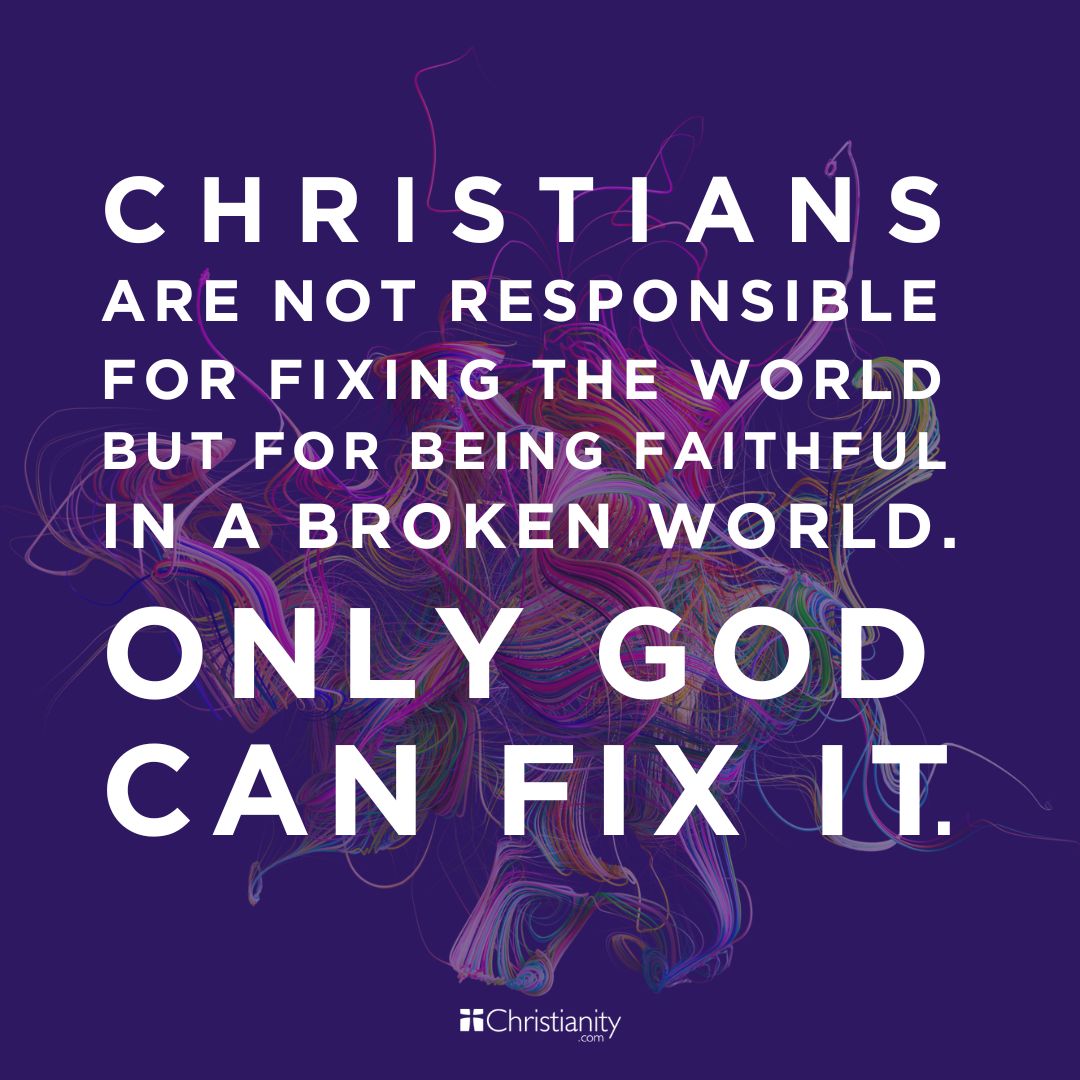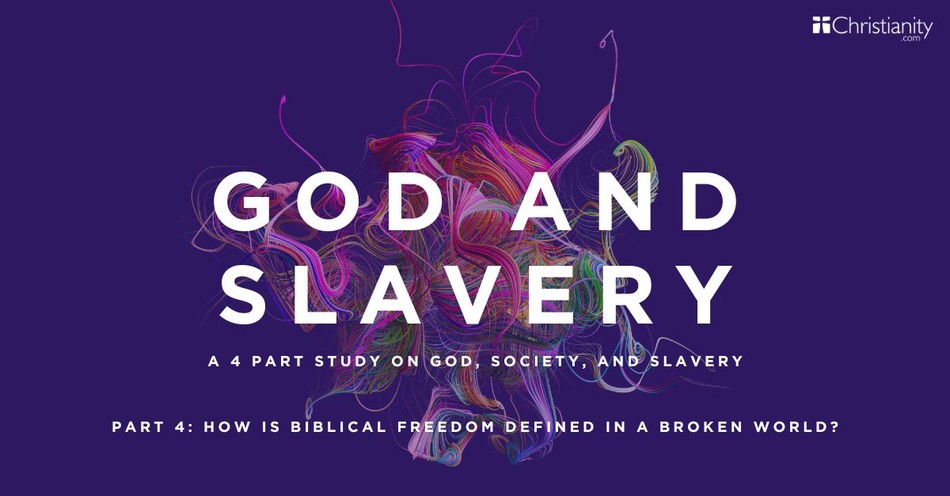In Romans 6, Paul notes that humans have two basic choices. They can be slave to sin or slaves to righteousness (6:15-19). While Paul clarifies that the analogy with slavery has its shortcomings (6:19), he uses it to highlight something similar to Jesus’s teaching about God and money: “No servant can serve two masters” (Lk 16:13; Matt 6:24). Freedom from sin does not yield autonomy, but devotion to a different master. We always serve something.
The “black and white” nature of Paul’s teaching in Romans 6 is not trivial. It should remind us that apart from Christ, humans are bound by sin and incapable of imitating Christ. That does not mean all those who do not know Christ consistently practice immorality. Instead, it means they are subject to sin and must live according to its logic and limitations. There is, at best, some mix of false hopes and muddled visions of a “better” future. Those who are slaves to sin cannot rightly order their love because they have no loyalty to the Triune God.
As Christians, we are right to identify abusive social arrangements like slavery. We are right to recognize that no way of ordering society can usher in a perfectly harmonious world. Social arrangements like human trafficking, slavery, systematic torture and genocide, and myriad other relationships will continue to arise. Some of these practices can be stopped. Others can be restrained through various sorts of regulation and policing. Efforts to stop or manage these practices are necessary but not sufficient. They are an indispensable way we suffer in the broken world as we wait patiently for God to usher in the new creation.
Why is it important to understand our efforts as necessary but insufficient acts nested in an enduring faith in God expressed, in part, by our willingness to wait patiently for him to make all things new? It is important because we will be tempted to cross boundaries to remake the world in our own image. Christians are not responsible for fixing the world but for being faithful in a broken world. Only God can fix it. Often, that faithfulness will involve efforts to end the suffering of others, to work with governing authorities to bring about justice, or to speak theologically to governing authorities denying God in various ways. Faithful endurance is not inactive or callous.
God, the Nations, and Slavery
When considering the issue of slavery in the Hebrew Bible, we need to keep in mind that God uses nations, even the nation of Israel, to manage the chaos associated with a broken world. God’s utopian vision is eschatological. As such, the interrelationships between the nations are not intended to bring about a utopia in the near term. Instead, the nations are given allotted times and boundaries that those within them “should seek God and perhaps feel their way toward him and find him” (Acts 17:26-27). In the Hebrew Bible, we see that the allotted times and boundaries of various nations are ended (or will be) by other nations (Gen 15:16; Dan 2:31-45). The exception, of course, is Israel, which was chosen as God’s special possession and heritage (Deut 32:9; Ps 33:12). While Israel is taken into exile by Babylon (Jer 25:8-14), God restores Israel through Cyrus and Persia (2 Chron 36:22-23; Isa 45:1-7). The rise (and fall) of nations serves God’s purposes, but the iniquity of the nations does not go unnoticed. No sinful action will be ignored.
So, how does any of this help us understand slavery in the Hebrew Bible? It is often assumed that God should have condemned and prohibited slavery or eliminated conditions such as war and poverty that often led to slavery. Such an assumption isn’t unwarranted. As I noted in a previous article, God created humankind in such a situation. After the fall, God engages in a mix of activities within his broken creation. The pictures of creation and new creation, as well as the portrayal of and theological reflection on the life of Christ, reflect the ideal God desires. What we see as God interacts with a fallen world is not an endorsement of the world’s fallenness but the gracious forbearance of a God who will eventually redeem the world.
We can acknowledge that the practices of the nations are far from pristine. Israel is a chosen nation in a fallen world. As such, we should expect Israel, regardless of Israel’s behavior, to be confronted by the same challenges as all the other nations seeking to survive and thrive in a world ravaged by sin. Israel’s practices are similar to those of other ancient Near Eastern nations. That isn’t an excuse or a justification. It’s simply a reality of a life that won’t be fixed until the new creation. War, poverty, famine, death, and a variety of other tragedies will impact Israel and require some response (and, hopefully, a faithful one).

Social Arrangements Versus the Underlying Problem of Sin
As I’ve suggested previously with regard to the institution of kingship in Israel, there are times when God authorizes social arrangements that (a) he would not otherwise choose, (b) will have negative consequences, and (c) have deep theological ramifications. While the Bible is silent on God’s reasons, it seems plausible that God’s willingness to accept such social relationships has less to do with his endorsement of them in the abstract and more with the lack of an ideal alternative. In other words, when any and all social arrangements will have negative consequences and offer distinct opportunities for theological distortions, moving from one to another won’t change the underlying problem of disobedience that needs to be solved. As God tells Israel,
“I will sprinkle clean water on you, and you shall be clean from all your uncleannesses, and from all your idols, I will cleanse you. And I will give you a new heart, and a new spirit I will put within you. And I will remove the heart of stone from your flesh and give you a heart of flesh. And I will put my Spirit within you, and cause you to walk in my statutes and be careful to obey my rules.” - Ezek 36:25-27
If we think about society in terms of patterns instituting specific social arrangements, we may distinguish between a particular social arrangement and the accepted dynamics within that arrangement. In the New Testament, Paul does not seek to eliminate certain social arrangements. Paul does not deny the hierarchy between husbands and wives, noting, “…the husband is the head of the wife even as Christ is the head of the church…” (Eph 5:23). Male headship is not abolished, but how that headship is exercised (i.e., the dynamics of the hierarchy and values conveyed by it) is transformed in light of Jesus Christ. We see something similar in Paul’s teachings to slaves and masters (Eph 6:5-9; Col 3:22; 4:1; 1 Tim 6:1-2; Titus 2:9).
Similarly, there is a distinction between Joseph’s experience serving as Pharaoh’s second in command (Gen 41:40) and the Israelites under the Pharaoh who did not know Joseph (Exod 5:10-21). In both situations, we see an established hierarchy. In the former, however, the Pharaoh recognizes the work God is doing through Joseph and treats him and the Israelites kindly. In the latter, the new Pharaoh believes the Israelites are a threat and presses them into hard labor. The hierarchy is not the problem. Instead, the problem comes when the one atop the hierarchy exercises their authority apart from God.
This line of argument is not intended to suggest that slavery is an appropriate social arrangement…far from it. Rather, the point is that any and all social arrangements will have certain negative consequences. Apart from Christ, the world is broken. As such, the Bible does not advocate for any specific social arrangement. As Old Testament scholar John Walton notes, “It [the Torah] provides neither a portrait of nor a template for an ideal society, and since it is embedded as stipulations in a covenant, it provides no mandate for anyone else to construct such a society or base a society on it.” Rather than advocating for an “ideal society,” the Bible calls men and women to pursue wisdom and knowledge which begin with the fear of the Lord (Prov 1:7; 9:10).
Understanding God's Interaction with a Broken World
The world is not as it should be. The Bible portrays God’s activities within a marred and distorted version of his own creation. Until God remakes the world so that there is no more “mourning, nor crying, nor pain anymore” (Rev 21:4), he (like us) interacts with a world ravaged by sin. That world does not capture God as we are. Instead, the time has not yet come for the “former things” to pass away (Rev 21:4).
When we consider the topic of slavery in the Hebrew Bible, we need to recognize that much of what we find in both the Old and New Testaments is lamentable. Simply because a particular social arrangement (like servitude) was normative does not mean it was desirable. Unfortunately, if we approach matters like slavery in the Hebrew Bible intending to defend such practices, we risk adopting a dispassionate perspective. Yet, a purely intellectual understanding of such an issue is inadequate. We need to model the biblical portrayals of those who look out upon an unjust and cry out to God for justice (Rev 6:9-11). We must practice pure and undefiled religion that prompts us to visit “orphans and widows in their affliction” (Jam 1:27).
Finally, as we think about God’s relationship to evil, we must not assume the moral high ground. Those who call God into question for working the way he did (and does) within a broken world forget that God is not the problem…we are. God has acted and continues to act to redeem humanity. We can participate in that redemption, but don’t do it by demeaning or mischaracterizing God. Instead, we do it by conforming more closely to the image of Christ. As Peter notes,
“Since all these things are thus to be dissolved, what sort of people ought you to be in lives of holiness and godliness, waiting for and hastening the coming of the day of God…” - 2 Peter 3:11-12
Photo Credit: SWN Design
Part 1: Why Understanding Slavery in the Bible Matters Today
Part 2: How God Handles Divorce and Other Broken Social Norms
Part 3: What Sets Modern Human Trafficking Apart from Ancient Slavery?



.jpg)
